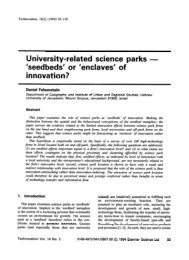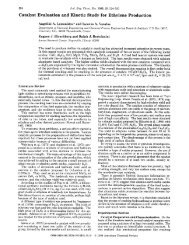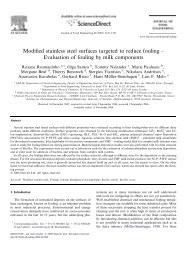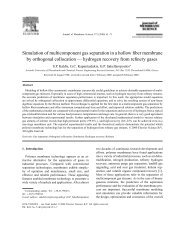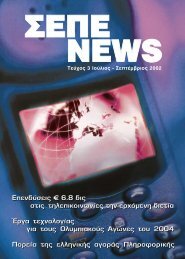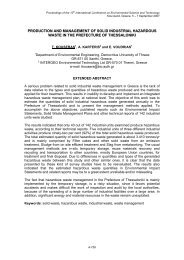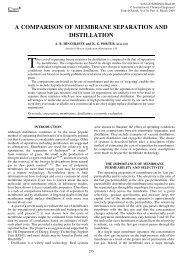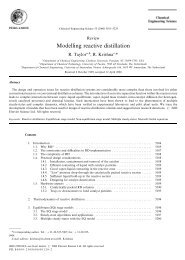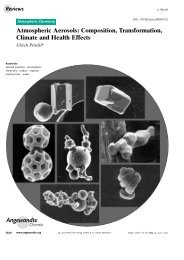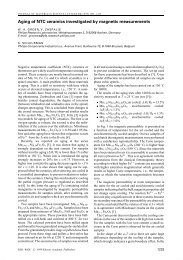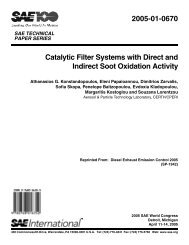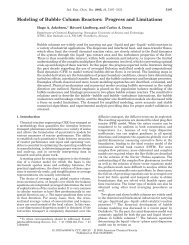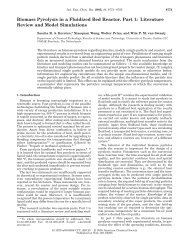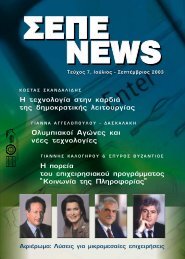RTD info - European Commission - Europa
RTD info - European Commission - Europa
RTD info - European Commission - Europa
You also want an ePaper? Increase the reach of your titles
YUMPU automatically turns print PDFs into web optimized ePapers that Google loves.
14<br />
<strong>RTD</strong> <strong>info</strong> Special Science and Media September 2002<br />
T E L E V I S I O N<br />
Some 66.4% of <strong>European</strong>s ‘prefer to watch television programmes about science and<br />
technology than to read articles on the subject.’ (1) As the media ‘king’, how does television<br />
communicate scientific knowledge? Is the emphasis on <strong>info</strong>rming or entertaining? Who<br />
are science programmes aimed at? Is a <strong>European</strong> science channel a feasible proposition?<br />
TV science comes under the spotlight as we try to find some answers.<br />
‘Television news traditionally treats science<br />
as a bit of a break from the heavy stuff,<br />
going for optimism and spectacular pictures,<br />
such as those taken by the Hubble<br />
telescope. It offers an element of surprise, the cherry on the<br />
cake,’ believes TV and newspaper journalist Patrice Lanoy, a<br />
physicist by training and current president of the Association<br />
des journalistes scientifiques de la presse d’<strong>info</strong>rmation (France).<br />
‘More serious questions are covered in greater depth at other<br />
times, in particular by science programmes broadcast by certain<br />
<strong>European</strong> channels – some of those for young people being very<br />
good indeed – and the documentaries which are the main diet<br />
of the theme channels.’<br />
A<br />
A question of image(s) With a few exceptions,<br />
science programmes are scarcely considered as likely to boost<br />
audience ratings. Most channels therefore give priority to subjects<br />
with a certain popular appeal, such as health, the environment,<br />
biotechnologies and space. These are aimed at a wide<br />
audience, with the emphasis being on the popularisation of<br />
science and a dramatisation of research to appeal to the<br />
viewer’s imagination. Scientific disciplines are therefore dependent<br />
upon their image – and their images, in terms of their ability<br />
to provide sequences which should preferably be spectacular,<br />
poignant or shot in far-away or exotic locations. The animal<br />
kingdom lends itself very readily to this, many wildlife programmes<br />
being assured a comfortable success. (2) Ethnographic<br />
documentaries appeal simultaneously to our curiosity and love<br />
of the exotic, while archaeological documentaries have an<br />
element of mystery and can be portrayed in a manner worthy<br />
of the very best detective stories. As to astronomy and space<br />
research, these are clearly subjects that can grab the viewer’s<br />
imagination. On the other hand, subjects such as maths and<br />
physics are clearly going to find it more difficult to make their<br />
way on to the TV screens, unless the focus is on very concrete<br />
applications.<br />
The secret<br />
of small<br />
E =M6 (M6 – France)<br />
Over the past ten years, the E=M6 team has<br />
managed to attract a weekly audience of 4 million<br />
viewers to this popular weekly science<br />
programme which goes out at peak viewing<br />
time on this private channel. The magazine<br />
programme aims to increase understanding of<br />
nature, the world and technologies around us.<br />
Science is often explained through the prism<br />
of daily life, with experts from various disciplines<br />
(doctors, sociologists, nutritionists)<br />
analysing the day-to-day life of a French family,<br />
for example. Special programmes also try<br />
to shed light on an increasingly complex environment,<br />
thanks to the answers provided by<br />
scientists and technicians.<br />
www.em6.fr/<br />
Matière Grise<br />
(RTBF – Belgium)<br />
First broadcast in 1998, Matière<br />
Grise goes out every five weeks on<br />
RTBF. It has become a reference in<br />
the Belgian audio-visual landscape,<br />
praised for its solid content, simple<br />
structure and dynamic presentation.<br />
Its producer and presenter Patrice Goldberg is determined<br />
that the language should be accessible to all. As a result, it<br />
regularly attracts a large audience, despite its 10.30pm slot<br />
on Thursday evenings.<br />
www3.rtbf.be



